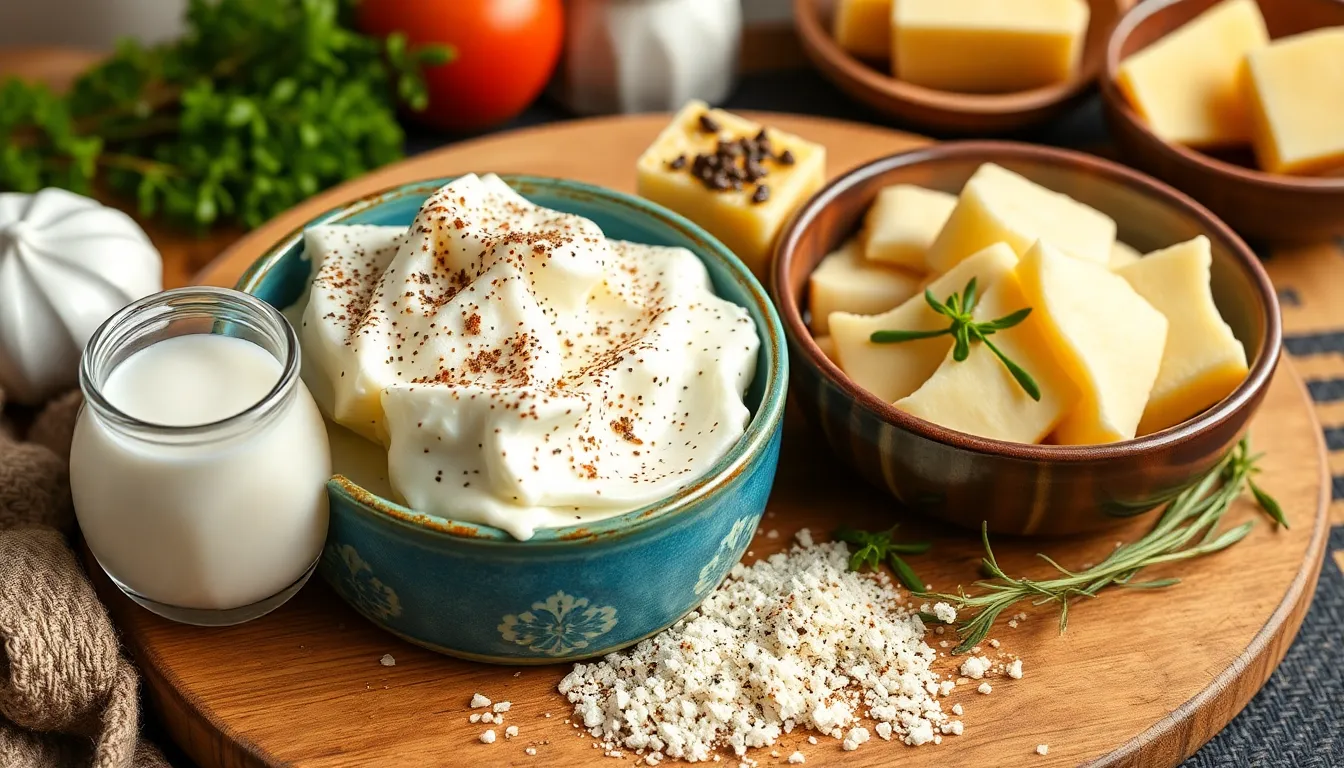Dairy in Mediterranean Cooking: Flavorful Recipes to Try
The Mediterranean region is a vibrant tapestry of cultures, landscapes, and flavors, all of which contribute to its rich culinary heritage. Among the many ingredients that define Mediterranean cuisine, dairy plays a pivotal role, enhancing flavors and textures in unique and delightful ways. From creamy cheeses to tangy yogurts, dairy products are indispensable in countless dishes across the Mediterranean basin. In this article, we’ll explore the significance of dairy in Mediterranean cooking, delve into popular dairy products, and share a collection of flavorful recipes that celebrate these ingredients.
The Role of Dairy in Mediterranean Cuisine
Dairy products are fundamental to Mediterranean cuisine, offering a spectrum of flavors and textures that complement a variety of dishes. The most commonly used dairy items include:
- Cheese: A staple in many Mediterranean countries, with varieties ranging from soft and creamy to hard and crumbly.
- Yogurt: Used in dips, dressings, and marinades, yogurt adds moisture and tang to dishes.
- Milk and Cream: Essential in desserts and for enriching sauces, lending a velvety texture to dishes.
The cultural significance of dairy cannot be overstated. In countries like Greece, Turkey, and Italy, local cheeses and yogurts are not just ingredients; they embody tradition and shared history. Dairy is often central to family meals and festive occasions, symbolizing hospitality and the joy of sharing meals with loved ones.
Moreover, dairy products are packed with nutritional benefits. They provide essential vitamins and minerals, including calcium and vitamin D, which are crucial for bone health. Additionally, dairy is a high-quality source of protein, making it an excellent addition to balanced meals.
Popular Dairy Products in Mediterranean Cooking
Subsection 2.1: Cheese Varieties
Cheese is perhaps the most beloved dairy product in Mediterranean cuisine, with each region boasting its own specialties. Here are a few popular varieties:
- Feta: A crumbly, salty cheese that originates from Greece. It’s often used in salads, pastries, and baked dishes.
- Halloumi: A semi-hard cheese from Cyprus that has a high melting point, making it perfect for grilling. It’s often served alongside vegetables or in sandwiches.
- Ricotta: An Italian cheese known for its creamy texture and mild flavor. It’s commonly used in desserts, pasta fillings, and as a topping for salads.
Subsection 2.2: Yogurt
Yogurt is another versatile dairy product integral to Mediterranean cuisine. Greek yogurt, in particular, has gained popularity worldwide for its creamy consistency and tangy flavor. It serves multiple purposes, such as:
- A base for traditional dips like Tzatziki, made with cucumbers and garlic.
- An ingredient in marinades to tenderize meats and enhance flavors.
- A topping for savory dishes, adding richness and balance.
Subsection 2.3: Milk and Cream
Milk and cream are essential in many Mediterranean desserts and baked goods. They bring richness and depth of flavor, enhancing the overall sensory experience of the dish. For instance:
- Panna Cotta: An Italian dessert made with cream, sugar, and gelatin, resulting in a silky texture.
- Flan: A custard dessert popular in Spain and other Mediterranean countries, often infused with caramel flavors.
Flavorful Recipes to Try
Subsection 3.1: Appetizers
Recipe 1: Spanakopita (Spinach and Feta Pie)
Ingredients:
- 1 package of phyllo pastry
- 400g fresh spinach, chopped
- 200g feta cheese, crumbled
- 1 onion, finely chopped
- 2 cloves garlic, minced
- 3 eggs
- Salt and pepper to taste
- Olive oil for brushing
Instructions:
- Preheat the oven to 180°C (350°F).
- In a skillet, heat olive oil over medium heat. Sauté the onion and garlic until softened.
- Add the chopped spinach and cook until wilted. Remove from heat and let cool.
- In a bowl, combine the spinach mixture with feta cheese, eggs, salt, and pepper.
- Lay one sheet of phyllo pastry on a greased baking tray, brushing it with olive oil. Repeat with a few more sheets.
- Spread the spinach and feta mixture on the pastry, then fold over the edges.
- Cover with a few more layers of phyllo, brushing each with olive oil. Cut slits on top to allow steam to escape.
- Bake for 30-40 minutes or until golden brown. Serve warm.
Recipe 2: Labneh with Olive Oil and Herbs
Ingredients:
- 500g Greek yogurt
- 1 tsp salt
- Olive oil
- Fresh herbs (mint, thyme, or za’atar) for garnish
Instructions:
- In a bowl, mix Greek yogurt with salt. Line a sieve with cheesecloth and place over a bowl.
- Pour the yogurt mixture into the sieve and let it drain in the refrigerator for at least 12 hours.
- Once thickened, transfer the labneh to a serving plate, drizzle with olive oil, and sprinkle with fresh herbs.
- Serve with warm pita bread or vegetables for dipping.
Subsection 3.2: Main Courses
Recipe 1: Chicken Souvlaki with Tzatziki Sauce
Ingredients:
- 4 chicken breasts, cubed
- 2 tbsp olive oil
- 1 tbsp lemon juice
- 1 tsp oregano
- Salt and pepper to taste
- For Tzatziki: 1 cup Greek yogurt, 1 cucumber (grated), 1 clove garlic (minced), 1 tbsp olive oil, salt
Instructions:
- In a bowl, combine olive oil, lemon juice, oregano, salt, and pepper. Add chicken and marinate for at least 30 minutes.
- Meanwhile, prepare the tzatziki by mixing all the ingredients in a bowl. Refrigerate until ready to serve.
- Thread marinated chicken onto skewers and grill over medium heat until cooked through, about 10-15 minutes.
- Serve the chicken souvlaki with tzatziki sauce and warm pita bread.
Recipe 2: Pasta with Ricotta and Spinach
Ingredients:
- 250g pasta of your choice
- 200g ricotta cheese
- 200g fresh spinach
- 2 cloves garlic, minced
- Olive oil
- Salt and pepper to taste
- Parmesan cheese for serving
Instructions:
- Cook the pasta according to package instructions until al dente. Drain and set aside.
- In a skillet, heat olive oil over medium heat and sauté garlic until fragrant.
- Add spinach and cook until wilted. Stir in ricotta cheese, mixing until creamy.
- Toss in the cooked pasta, adding salt and pepper to taste. Serve with grated Parmesan cheese on top.
Subsection 3.3: Desserts
Recipe 1: Baklava with Honey and Yogurt Drizzle
Ingredients:
- 1 package of phyllo dough
- 200g mixed nuts (walnuts, pistachios), finely chopped
- 100g melted butter
- 1 tsp cinnamon
- 1 cup honey
- 1 cup Greek yogurt
Instructions:
- Preheat the oven to 175°C (350°F).
- Melt half the butter and brush a baking dish with it. Layer 10 sheets of phyllo, brushing each with butter.
- Mix chopped nuts with cinnamon and spread over the phyllo layer.
- Continue layering phyllo sheets (about 10 more), brushing with butter between layers.
- Cut the baklava into diamond shapes and bake for about 30-35 minutes until golden.
- In a saucepan, heat honey until it becomes liquid and pour over baklava as soon as it is out of the oven.
- Serve warm or at room temperature, drizzled with Greek yogurt.
Recipe 2: Panna Cotta with Mediterranean Flavors
Ingredients:
- 500ml heavy cream
- 100g sugar
- 1 vanilla bean (or 1 tsp vanilla extract)
- 2.5 tsp gelatin
- 1/4 cup water
- Fresh berries or citrus zest for garnish
Instructions:
- In a saucepan, heat cream, sugar, and vanilla over low heat until sugar dissolves. Do not boil.
- In a small bowl, sprinkle gelatin over water and let sit for 5 minutes to bloom.
- Add the bloomed gelatin to the cream mixture and stir until dissolved.
- Pour into molds and refrigerate for at least 4 hours until set.
- Serve with fresh berries or a drizzle of citrus zest on top.
Tips for Cooking with Dairy in Mediterranean Dishes
When working with dairy in Mediterranean cooking, consider these best practices:
- Quality Matters: Choose high-quality dairy products, as they will greatly enhance the flavor of your dishes. Look for artisanal cheeses and locally sourced yogurts when possible.
- Pairing: Dairy pairs beautifully with fresh herbs, vegetables, and citrus. Experiment with combinations to elevate your dishes.
- Storage Tips: Properly store dairy products in the refrigerator to maintain freshness. Use airtight containers for opened products and try to consume them within their shelf life.
Nutritional Insights
Understanding the nutritional content of dairy products can help you make informed choices. The following table compares the calories, fat content, and protein levels of popular Mediterranean dairy products:
| Dairy Product | Calories (per 100g) | Total Fat (g) | Protein (g) |
|---|---|---|---|
| Feta Cheese | 264 | 21 | 14 |
| Greek Yogurt | 59 | 0.4 | 10 |
| Ricotta Cheese | 174 | 10 | 11 |
| Halloumi | 321 | 25 | 22 |
As evident from the table, different dairy products have varying nutritional profiles. Incorporating a variety of these dairy items can contribute to a well-rounded diet while enjoying the rich flavors of Mediterranean cuisine.
In conclusion, dairy plays a vital role in Mediterranean cooking, enhancing flavors and contributing to the region’s culinary identity. From appetizers to desserts, dairy products like cheese, yogurt, and cream are essential components that create unforgettable dishes. With this knowledge and delicious recipes, you can embark on your journey into the heart of Mediterranean cuisine. Happy cooking!




